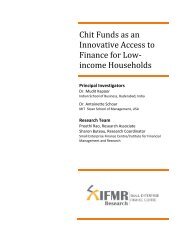Government of India Volume I: Analysis and Recommendations
Government of India Volume I: Analysis and Recommendations
Government of India Volume I: Analysis and Recommendations
Create successful ePaper yourself
Turn your PDF publications into a flip-book with our unique Google optimized e-Paper software.
CONSUMER PROTECTION<br />
providers. The regulator will specify the requirements <strong>and</strong> process for the registration <strong>of</strong> such<br />
individuals as well as any code <strong>of</strong> conduct applicable to them.<br />
2. Information on new products<br />
The Commission believes that consumer protection regulation, as in other areas <strong>of</strong> law, should<br />
be guided by the principle <strong>of</strong> allow-<strong>and</strong>-respond, instead <strong>of</strong> following the banned-until-permitted<br />
approach. Accordingly, the draft Code does not require every financial product to be approved<br />
by the regulator.<br />
Financial service providers will be able to provide any financial product to consumers subject<br />
to following a file <strong>and</strong> use process. This will require the regulator to make regulations to specify<br />
the kind <strong>of</strong> information required by it on any new product that is proposed to be launched in<br />
the market. A financial service provider will be required to file the specified information with<br />
the regulator two months before the planned launch, so that the regulator may assess its risks<br />
<strong>and</strong> merits <strong>and</strong> if required, make appropriate regulations. The regulator may seek additional<br />
information about the product during the two month period but will not have the power to block<br />
it from being launched after the expiry <strong>of</strong> that period.<br />
3. Power to specify modifications<br />
The regulator should be able to intervene in situations where certain features or aspects <strong>of</strong> a financial<br />
product or service are found to be harmful for consumers after it has been introduced in<br />
the market. The draft Code therefore allows the regulator to specify modifications in the terms<br />
<strong>and</strong> conditions <strong>of</strong> particular financial contracts or the process <strong>of</strong> delivering particular financial<br />
services. The Commission however recognises that this is a very strong power <strong>and</strong> its frequent<br />
use can cause undue hardships to financial service providers. Any such regulatory interventions<br />
must therefore be accompanied by a statement explaining the other interventions that were<br />
considered by the regulator to address the problem <strong>and</strong> the reasons why such interventions<br />
were found to be inadequate. This statement is in addition to the regular requirements <strong>of</strong> the<br />
regulation-making process.<br />
5.7. Advisory council on consumer protection<br />
In order to monitor <strong>and</strong> contribute towards the regulator’s consumer protection objectives,<br />
the Commission recommends the creation <strong>of</strong> an advisory council on consumer protection<br />
(see Table 5.9). The advisory council will be responsible for:<br />
1. Making representations, in the form <strong>of</strong> advice, comments or recommendations, on the regulator’s<br />
policies <strong>and</strong> practices;<br />
2. Reviewing, monitoring, <strong>and</strong> reporting to the regulator on the effectiveness <strong>of</strong> its policies <strong>and</strong> practices;<br />
<strong>and</strong><br />
3. Creating reports stating its views on all draft regulations published by the regulator.<br />
The regulator must take into account any representations or reports received by it<br />
from the advisory council <strong>and</strong> provide a written response in cases where the regulator<br />
disagrees with the views or proposals made by the council.<br />
5.8. Financial redress agency<br />
The Commission recommends the creation <strong>of</strong> a new statutory body to redress complaints<br />
<strong>of</strong> retail consumers through a process <strong>of</strong> mediation <strong>and</strong> adjudication. The redress agency<br />
will function as a unified grievance redress system for all financial services. To ensure<br />
complete fairness <strong>and</strong> avoid any conflicts <strong>of</strong> interest, the redress agency will function independently<br />
from the regulators.<br />
The financial redress mechanism proposed by the Commission will replace the existing<br />
financial sector-specific ombudsman systems such as the banking ombudsman <strong>and</strong><br />
50 FINANCIAL SECTOR LEGISLATIVE REFORMS COMMISSION



